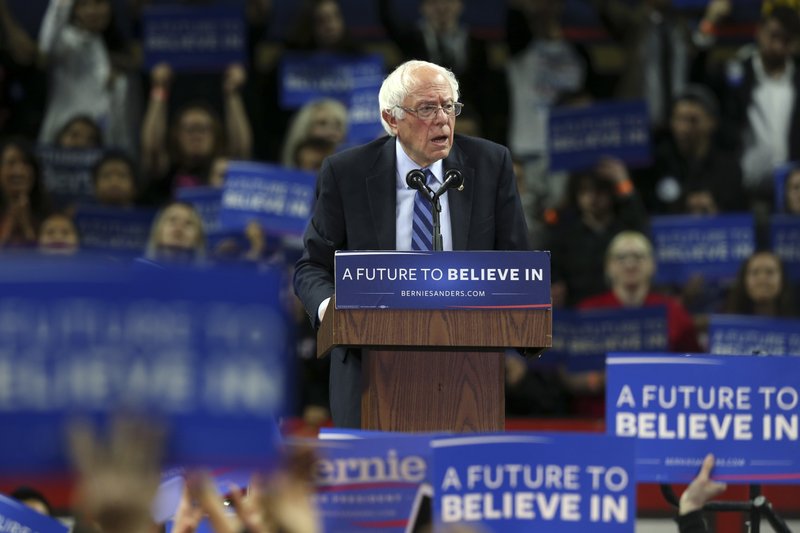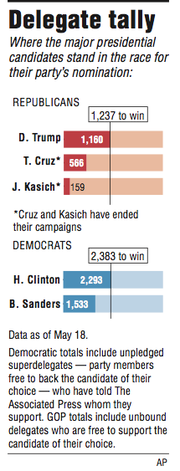WASHINGTON -- Bernie Sanders on Wednesday showed no intention of dialing back his campaign against Hillary Clinton or urging his supporters to fall in line after the former secretary of state's claim of a narrow victory in Kentucky and the senator's win in Oregon.
RELATED ARTICLES
http://www.arkansas…">Hackers target U.S. campaigns http://www.arkansas…">Trump helps Christie on debt
FULL ELECTION COVERAGE
A Sanders campaign spokesman said the senator is considering seeking a recount in Kentucky, where Clinton was clinging to a lead of half of a percentage point.
"We are in until the last ballot is cast," Sanders told supporters Tuesday at a rally in Carson, Calif., saying he believes he can win the June 7 primary in that state.
"We have the possibility -- it will be a steep climb, I recognize that -- but we have the possibility of going to Philadelphia with the majority of the pledged delegates," he said of the July nominating convention.
He said that in early general election polling, he does "much better against Trump" than Clinton.
Sanders added 34 delegates from Oregon to Clinton's 25, and in Kentucky, each picked up 27, with one delegate still up for grabs because of the close vote.
Clinton still leads Sanders in the delegate count, with 1,768 compared with the senator's 1,494. That lead grows wider when counting superdelegates -- elected officials and party leaders who are free to back the candidate of their choice -- with Clinton at 2,293 and Sanders at 1,533. It takes 2,383 total delegates to secure the nomination.
Those numbers put Clinton at 96 percent of the way toward clinching the nomination, according to an Associated Press estimate Wednesday. Sanders is 64 percent of the way to the nomination. He'd need to win about two-thirds of the rest of the pledged delegates to pull even with Clinton by the end of the nominating race.
For the Republicans, businessman Donald Trump handily won Tuesday's only GOP contest, in Oregon, padding his lead with at least 17 of Oregon's 28 delegates. Sen. Ted Cruz of Texas and Ohio Gov. John Kasich each picked up at least three delegates, despite having suspended their campaigns earlier this month. It takes 1,237 delegates to secure the nomination.
Trump, the only Republican candidate actively campaigning, has about 94 percent of the delegates needed.
The split outcome in Tuesday's Democratic primaries gives Clinton little leverage to push Sanders to unify his supporters behind her in preparation for an expected campaign against Trump, who is using the extended primary contest to attack Clinton's standing in her own party.
With Clinton holding a large lead in the nomination race, she and party leaders had been looking to take advantage of a split in the Republican Party over Trump that has been opening since the start of the primary campaign. Instead, they're dealing with their own divisions. That was illustrated by a ruckus by Sanders supporters during last weekend's state party convention in Nevada.
Some Sanders backers threw chairs and shouted down speakers during the convention, at which Clinton was awarded a majority of delegates, in a dispute over rules. The chairman of the Nevada Democratic Party was subjected to threatening messages on her voice mail.
Senate Minority Leader Harry Reid, D-Nev., said Tuesday that he spoke to Sanders about the incidents and that he was confident the candidate would speak out against violence by his supporters. He called it a "test of leadership."
Sanders responded with a statement saying that Democratic leaders must "understand that the political world is changing and that millions of Americans are outraged" at the political and economic establishment. He added that "it goes without saying that I condemn" any violence or personal harassment.
Later, at a rally in California, Sanders suggested there would be consequences for Democratic Party leaders if they don't change the rules to expand participation for independents and newcomers.
"Open the doors; let the people in," Sanders said Tuesday, after supporters booed the mention of the Democratic Party. "Welcome into the party people who are prepared to fight for real economic and social change." He said the other option for the party would be to "maintain its status quo structure, remain dependent on big-money campaign contributions and be a party with limited participation and limited energy."
The Nevada Democratic Party said in a statement that the Sanders campaign was being "dishonest about what happened Saturday and is failing to adequately denounce the threats of violence of his supporters."
"We believe, unfortunately, that the tactics and behavior on display here in Nevada are harbingers of things to come as Democrats gather in Philadelphia in July for our National Convention," the state party's lawyer wrote in a formal complaint to the Democratic National Committee.
But Sanders' senior adviser, Tad Devine, brushed aside concerns about the senator's loyalty to the Democratic cause. "He intends to support the nominee of the party even if it is not him," Devine said.
Democrats seek unity
Democrats, including some of Sanders' Senate colleagues, urged him to encourage party unity and speak out against the actions of his supporters.
"He needs to tell whoever is conducting this violence that it is completely anathema to his own values, that he calls on them to stop it, that it's anathema to our party's values and to our country's values, and I hope that he will," said Sen. Tim Kaine of Virginia, a Clinton supporter. "A primary can be a very good thing, but at the end of the day there is a winner, and then it is really important for people to pull together because the stakes are existential in November to virtually every value that Bernie Sanders cares about."
Sen. Barbara Boxer, D-Calif., said in an interview that she spoke with Sanders this week and found her Vermont colleague very upset, adding that he insisted "my people wouldn't do this."
"I just told him, 'Bernie, you need to take control of this,'" Boxer said.
"Everything our families care about is at stake here," she said, adding that she feared for her safety after being booed and shouted down at the Nevada convention.
Boxer and other influential Democrats cited Clinton's handling of her drawn-out loss to Barack Obama eight years ago as a model. At the end of that campaign, Clinton washed away a season of bad blood by conceding and throwing her support behind the eventual president.
"The math didn't add up for her then, and it doesn't add up for Bernie now," said Sen. Debbie Stabenow, D-Mich.
Vice President Joe Biden gently chastised Sanders, saying he should be more aggressive in speaking out if his supporters behave as badly as they did in Nevada, but expressing confidence the party would unify. "I'm not worried. There's no fundamental split in the Democratic Party," he said Wednesday in Ohio.
Overall, Sanders has won 20 states. Any additional wins for Sanders give him more standing to demand concessions from the party in order to bring over his supporters even if he cannot secure the nomination.
But Clinton's early wins in larger states and her advantage with Democratic superdelegates have made it an increasingly uphill battle for Sanders to catch up to her in the overall delegate count.
Few are demanding publicly that Sanders get out of the race. Right now, the party's leaders want to avoid making the campaign so bitter that Sanders' backers refuse to rejoin the fold.
"People are trying to reach out and make sure that this thing doesn't get ruptured," Sen. Claire McCaskill, D-Mo., said. The question, she said, is will Sanders "go all-in to help Hillary Clinton defeat Donald Trump?"
Reid and Sanders have discussed Sanders' Senate future. They've also spoken about campaigning for Senate Democrats and likeminded candidates like Wisconsin's Russ Feingold, who said Wednesday that there is no hurry for Sanders to quit.
"We'll get it all together in July," Feingold said.
GOP fundraising
With fractures among the Democrats, the Republicans were the ones showing a force of unity, with the Republican National Committee announcing Tuesday night that it had forged a joint fundraising agreement with Trump.
The deal allows donors to make contributions as large as $449,400 spread among the national committee and party committees in 11 states. Trump's campaign can accept only $2,700 increments from each large check that the party receives.
The agreement is the product of weeks of negotiations and presents Trump with his first opportunity to collect large checks from donors. The RNC's finance chairman, Lewis Eisenberg, will work with Trump's national finance chairman, Steve Mnuchin, a former Goldman Sachs executive.
The structure is similar to the one created for Mitt Romney's campaign in 2012: Romney's home state, Democratic-leaning Massachusetts, was included in his agreement, while Trump has included New York, a state that he believes he can make competitive despite its heavy Democratic edge. Pennsylvania is not on the list, and neither is Ohio or Florida.
Trump's team is leaning heavily on the RNC for key components of campaign infrastructure, such as field operations and voter-file data. His campaign manager, Corey Lewandowski, is said to be leading the fundraising effort internally, with a close ally, Eli Miller, as the chief operating officer.
Separately, Trump released a list of 11 potential picks to replace Antonin Scalia on the Supreme Court, a mix of federal and state judges.
"I have a lot of people that are conservative that really like me, love everything I stand for, but they really would like to know my view," Trump said Wednesday in an interview with Fox News, "because perhaps outside of the defense of our country, perhaps the single most important thing the next president is going to have to do is pick Supreme Court justices."
Obama has nominated Merrick Garland, the chief judge of the U.S. Court of Appeals for the District of Columbia Circuit, but the Republican-led Senate has been steadfast in its refusal to consider the appointment to the high court.
Trump's list featured several prominent names floated repeatedly on conservatives' wish lists to replace Scalia.
Among the judges on Trump's list is Joan Larsen, who serves on the Michigan Supreme Court. A former law clerk to Scalia, Larson delivered one of the tributes to the late justice at his memorial service. She served in the Justice Department office that produced the legal justifications for the enhanced interrogation techniques, including waterboarding, that critics have called torture.
"I was surprised," Larson said. "I did see the list and those are incredibly distinguished jurists, and I'm honored to be associated with judges on that list. It's an incredible list."
Other state supreme court justices on the list are Don Willett of Texas, Allison Eid of Colorado, Thomas Lee of Utah and David Stras of Minnesota.
The remaining names are federal judges appointed to their current posts by President George W. Bush: Steven Colloton and Raymond Gruender, both of the 8th U.S. Circuit Court of Appeals; Thomas Hardiman, of the 3rd U.S. Circuit Court of Appeals; Raymond Kethledge, of the 6th U.S. Circuit Court of Appeals; William Pryor Jr., of the 11th U.S. Circuit Court of Appeals; and Diane Sykes, of the 7th U.S. Circuit Court of Appeals.
Sen. Charles Grassley, R-Iowa, who as chairman of the Senate Judiciary Committee has refused to hold a hearing to consider Garland's appointment, said Trump has "laid out an impressive list of highly qualified jurists."
"Understanding the types of judges a presidential nominee would select for the Supreme Court is an important step in this debate so the American people can have a voice in the direction of the Supreme Court for the next generation," he said.
Information for this article was contributed by Margaret Talev, Steven T. Dennis, Sahil Kapur and Arit John of Bloomberg News; by Erica Werner, Ken Thomas, Scott Bauer, Jill Colvin and Mark Sherman of The Associated Press; and by Maggie Haberman of The New York Times.
A Section on 05/19/2016

